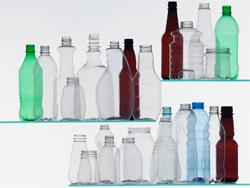PET Recycling Efforts Falling Behind
- Home
- News
-
PET Recycling Efforts Falling Behind
Washington, DC, July 31, 2007--Americans are throwing away billions of pounds of the clear plastic that soft drink bottles and other containers are made of, even as demand for the recycled material soars, accoridng to Cox News.
The plastic, polyethylene terephthalate, or PET, appears on grocery shelves and in vending machines as containers for soft drinks, water, shampoo, ketchup and other products on a list that gets longer every year.
The most recent survey by the National Association for PET Container Resources, an industry trade group, shows that last year more than 5 billion pounds of PET was used in plastic containers.
Only about 1 billion pounds was recycled, the group reported. At salvage prices that range as high as 25 cents per pound, the remaining 4 billion pounds represent the equivalent of sending a billion $1 bills to landfills.
The group said recycling efforts are falling behind, noting that in 1995, the country used about 2 billion pounds of "virgin" PET resin and recycled approximately 775 million pounds.
Recycling advocates are grappling for ways to increase the quantity of PET that is reclaimed. One proposal envisions a national "recycling lottery" in which every plastic bottle, as well as every aluminum can, would become a potential ticket to Easy Street.
Coca-Cola, the world's largest beverage company, last year abandoned an effort to use recycled PET in the production of bottles, declaring that the processes involved were too expensive.
Instead, Coke will concentrate on using less PET per bottle and finding ways to encourage other people to recycle, said Scott Vitters, the company's director of sustainable packaging.
In fact, the problem finding uses for post-consumer PET has never been the problem.
As soon as the material can be collected and cut up into a new raw material — called "dirty flake" or "clean flake" in the trade, depending on whether extraneous material such as bottle labels and caps are mixed with the PET — an avid world market gobbles it up.
About 40 percent of reclaimed U.S. PET is exported to China, while U.S. recyclers are importing essentially the same product from Peru, Mexico, India and Brazil, mostly as "dirty flake," said National Association for PET Container Resources spokesman Dennis Sabourin.
"No one in the United States is willing to pay the prices that China pays," Sabourin said.
Yet, in a twist frustrated recycling advocates see as appropriately weird, some of the post-consumer PET imported by the United States comes from China.
Frank Endrenyl, vice president of sustainable development at Mohawk Industries of Dalton, Georgia, said his company, which manufactures carpeting, is America's largest user of post-consumer PET.
Last year Mohawk bought between 200 million and 250 million pounds — or 25% — of the country's recycled PET, Endrenyl said. The company uses the material to manufacturer polyester fiber for carpets, he said.
The Container Recycling Institute, a nonprofit advocacy organization, thinks it would be easier for Mohawk and other users of post-consumer PET to find supply if more states had container deposit laws.
Betty McLaughlin, executive director of the group, said the return rate in 11 states that have deposit laws averages 70%.
But, she added, the beverage and grocery industries are successful at beating back efforts to get more states to pass the requirements.
"The companies that don't like deposit laws are the ones that would be asked to step up and take some responsibility and participate in a program," she said. "They look at it as an added cost. There is the expense of having to do something with the material, and they'd rather not have to do it," she added.
Vitters acknowledges that Coke does not like container deposit laws, but cites other reasons.
"The problem with deposit laws is that they provide limited benefit in improving overall municipal waste and distract communities from really setting up cost-effective recovery programs," he said.
One of the initiatives Vitters says Coca-Cola is supporting is "RecycleBank," a company that says it offers incentives to families based on the amount of material that goes into their recycling bin. The company embeds a radio frequency identification tag in each family's bin. The family is then awarded RecycleBank "dollars" based on the weight of the material in its bin.
The play money can be redeemed for discount coupons at participating stores.
"We have 100,000 households in the pipeline for this year and expect to be at 1 million by 2008," said Lisa Pomerantz, a RecycleBank spokeswoman.
Such a system will do little to encourage recycling when the family bin is not near at hand. And that is one of the chief obstacles to reclaiming used PET containers, experts say.
"People are good about recycling materials in their kitchen bin," said Chaz Miller, director of state programs for the National Solid Wastes Management Association. "When they go out, they don't recycle. They throw things away."
Atlanta businessman Scott Seydel has floated an idea which he thinks might even solve that problem — a recycling lottery.
But he admits it hasn't caught on.
Under Seydel's plan, machines in supermarket or strip mall parking lots — the kind already used in states with deposit laws — would accept recycled containers, then issue a ticket for an independent "lottery" funded by companies that use recycled material.
Chuck Riegle, an official of reverse vending machine manufacturer TOMRA, said that "on paper" Seydel's idea looks good.
Seydel is more enthusiastic.
"As we say down in the Coca-Cola heartland, 'Go figger,'" he said in an e-mail.
"If people will spend their children's milk money on a $2 lottery ticket after driving 20 miles to cross a state line, ain't it logical that they'll put bottles or cans in a reverse vending machine to be given the same ticket?"
Related Topics:RD Weis, Mohawk Industries
